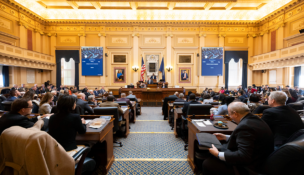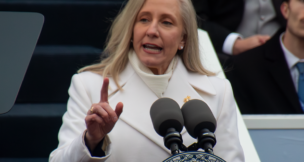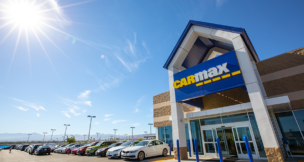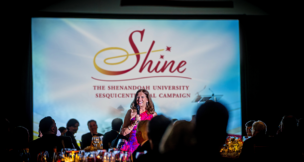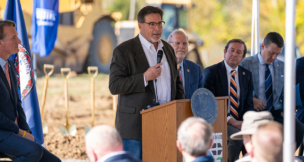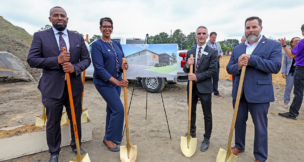The outsider
Gov.-elect Glenn Youngkin talks 2022 priorities
Mason Adams //December 31, 2021//
A former CEO who has never held political office, Glenn Youngkin will take the reins as Virginia’s next governor, having harnessed political tailwinds to a Republican sweep of statewide offices and GOP control of the House of Delegates.
The electoral success ended eight years of Democratic victories, but Virginia’s 74th governor will have to contend with Senate Democrats who maintain a narrow 21-19 majority.
Youngkin, 55, defeated former Democratic Gov. Terry McAuliffe 50.6% to 48.6%, exceeding even former President Donald Trump’s margins in rural Virginia while also improving on Trump’s performance in suburban counties, flipping several from previous elections.
A Richmond native who was a high school basketball star in Norfolk, the 6-foot-7-inch teen Youngkin scored a basketball scholarship to Houston’s Rice University. He went on to work for Credit Suisse Group AG and McKinsey & Co., specializing in mergers and acquisitions, before joining Washington, D.C.-based private equity firm The Carlyle Group in 1995, rising to co-CEO in 2018. Bloomberg News described his brief shared leadership with co-CEO Kewsong Lee as an acrimonious and awkward arrangement, with Lee running revenue-growing initiatives while Youngkin was saddled with stagnating divisions. Youngkin left Carlyle in September 2020, expressing a desire to pursue public service. He announced his gubernatorial candidacy in January 2021.
In the campaign for the GOP nomination, Youngkin went on to defeat better-known candidates such as longtime state Del. Kirk Cox, Sen. Amanda Chase and Pete Snyder at a drive-through Republican convention of 30,000 delegates who cast ranked-choice ballots at 39 sites across the state.
Youngkin balanced a careful line between appealing to Republicans fired up by Trump’s presidency and moderates and independents who want stability and centrism. He accomplished this by focusing on basic issues: education, cost of living and public safety. Assisted by a backlash against President Joe Biden and two years of unilateral Democratic control of Virginia, Youngkin’s victory has been embraced by national Republicans as a path forward after their losses during Trump’s term.
As a new governor with no previous political record, Youngkin begins with a blank slate, but observers already are making comparisons to past governors.
“[Youngkin] seems like a throwback to old business governors like John Dalton, or a modern version is Bob McDonnell,” says political analyst Larry Sabato, director of the University of Virginia’s Center for Politics.
In this exclusive interview with Virginia Business, Youngkin demonstrates his methodical approach to issues, listing his points and often pausing to summarize his message.
Virginia Business: You come into office with a one-term limit and a pretty narrow margin to move an agenda. What are your top priorities in Year One?
Virginia Gov.-elect Glenn Youngkin: First and foremost, my top priority is to make sure that we press forward with our Day One Game Plan … [which] is very clearly focused on making sure that we address some of the big challenges in Virginia.
To make Virginia more competitive, we’ve got to get our taxes down, to bring down our cost of living. One of the big issues we see in Virginia today is we’ve watched the cost of living really escalate in a runaway fashion. We’re now above the national average,1 and Virginians are moving away, faster than they’re moving here from the other 49 states. [Editor’s note: Youngkin’s assertion is based on IRS data that showed a net loss of Virginia taxpayers who moved to other states between 2013 and 2018. However, according to U.S. Census Bureau data, Virginia’s population grew by more than 530,000 during the 2010s, even though 71,103 people left Virginia for other states.]
We’ve got to get to work on eliminating the grocery tax and doubling our standard deduction and making sure that we do what we can to keep our veterans by excluding up to $40,000 of our veterans’ retirement [income from taxes]. Going into this year, we’re watching just massive overtaxation of Virginians. We’ve got to be more competitive with the states around us.
Second is our schools. We’ve got to reestablish expectations of excellence in our schools. That’s going to start with reestablishing high standards in our schools and then funding … the largest education budget in the history of Virginia, our top priority, [including] raising teacher salaries, [putting] funding into facilities and also funding our special education programs. Virginia’s kids with disabilities have suffered mightily over the last two years.
We absolutely are going to press forward aggressively with a new charter school program. School choice in our public schools has to be a giant element of K-12 education going forward. It is a big part of our Day One agenda.
Of course, finally, we’re going to have a curriculum that focuses on allowing our children to soar. It’s not a watered-down curriculum. It’s actually a curriculum that stretches our children. We’re going to have the support in place to make sure that children who need extra help can get it, but this will not be an education philosophy that is based on watering things down. It will actually be based on allowing our kids to run as fast as they can.
Then thirdly, we have to press forward with making our communities much safer than they are today. We’re going to comprehensively fund law enforcement with higher salaries — funding equipment, funding training budgets. We’re going to make the very difficult job of law enforcement one where we can begin to attract more people.
We’ve seen our mental health system … [has] been an area of crisis for the last eight years. We’ve got to fund additional resources to expand capacity, and to make sure that we can take care of those Virginians that are really suffering when it comes to mental behavioral health issues.
Finally, our parole board needs to be restructured. I will replace the parole board on Day One.
With those three initiatives, we are going to make our schools the envy again of the nation. We’re going to make sure that our communities are so much safer and we’re gonna get our cost of living down — those are building blocks to getting Virginia moving.
VB: You’ve previously discussed how, despite the fact that Virginia is the top-ranked state for business, we can’t compete with other states for the largest projects. So how can the state better approach economic development?
Youngkin: Yes, Virginia is not in the discussion on many, many, many of these important economic development opportunities. Even with some of the brand-name wins, we are trailing miserably versus our peer states. Virginia today is ranked 43rd in the nation in job recovery coming out of the pandemic.2 There [are] 235,000 jobs that have not recovered — jobs that were there in February 2020 that are not there now.3 That’s a real challenge for us. We are not competing. Tennessee, North Carolina, South Carolina, Georgia, Florida, Texas [and] even Maryland are competing substantially better than we are. We have got to compete.
When we’re going to be able to win is when we have a cost of living and a cost of doing business that’s competitive. We’ve got to get our tax structure down. We have to cut back the regulatory framework that is really challenging to businesses today.
Second thing we have to do is recognize that our workforce is well behind where it needs to be to staff into a growing economy. When you have an economy over eight years that grows at 0.9% compounded, you may identify workforce problems. But when you get this economy really cranked up and growing at 2.5%, which is our objective, we actually see those workforce challenges being a major inhibitor to growth. We have to do a much better job of getting Virginians back to work. Our labor participation rate is the lowest it’s been since these statistics have been kept.4
We’ve got to have a K-12-plus-higher-ed education system that develops and trains the workforce of the future. We’re not going to be able to attract businesses here if we do not have a workforce to convince them that they can grow here.
Finally, there are a number of industries where we should be absolutely outperforming our peer states. Those are industries where Virginia has a clear advantage. It starts with some of the easy ones, like government contracting and supporting the military. We should continue to attract a disproportionate amount of that opportunity into Virginia.
When it comes to agriculture, our largest independent industry in Virginia, we should be growing faster than we are [by] using our port as major leverage to bring processing into Virginia. These sectors where we have a major competitive advantage — the maritime industry, pharma and bio, data centers, cyber, logistics, energy broadly defined but specifically wind and, I believe, nuclear power — should be a big competitive advantage of ours.
Manufacturing has to be an industry of growth for us. We are not being considered for a lot of manufacturing footprint in aerospace and in automotive. We absolutely have to retool with site development to make sure that we have physical sites for these businesses to come build on and invest in.
Finally, the tourism and hospitality industry is one that has been mightily impacted by COVID and some of the unnecessary constraints that the current administration placed on it. I look forward to making sure that Virginia is open for business. We can retake some of the lost ground that we have seen in tourism and hospitality.
There are some real opportunities for us. All aspects of Virginia have regional competitive advantages, and we can go to work and open it up.
I firmly believe that a 2.5% normalized growth rate in Virginia is absolutely doable. It generates 400,000 new jobs. It also gives us an opportunity to climb up out of the basement when it comes to best places to start a business, where we can become an innovation economy, as opposed to a stalled one. The last place I want to be is 49th as the nation’s best place to start a business.5 We should have an absolute booming economy here in Virginia.
And oh, by the way, all of this can be done in four years.
VB: The pandemic’s reshaped life for everyone. Mask mandates and vaccine mandates have been hot button issues. What specifically do you want to change?
Youngkin: First and foremost, I will declare Virginia open for business, and make it very clear that we’re not going to have lockdowns and shutdowns. That’s incredibly important, because no business is going to invest in new facilities and new manufacturing and hiring new employees if they think it’s going to get closed down next week.
Second thing is that our schools are going to be open, because having dependable K-12 education, where folks know that their child is going to go to school and learn the things they need to learn, is critically important as well.
There [are] three big principles that I strongly believe in: No. 1, that the vaccine is the best way to keep yourself safe. I’ve gotten the vaccine, my family has gotten the vaccine, but I do not believe that government should mandate that everyone should get the vaccine. Second, I do not believe people should get fired for not getting the vaccine. We can absolutely use other procedures and protocols to keep people safe besides mandating the vaccine. Finally, I believe that parents should be making decisions on behalf of their children.
Therefore, executive orders that mandate that state employees have to get a vaccine and wear a mask, or an executive order that makes children [in] K-12 have to wear a mask — we’ll work with [the new commissioner of health and new Board of Health] to rescind that. Finally, [Attorney General-elect] Jason Miyares … has already confirmed that he will, with my support, push back hard against the Biden administration’s mandates that businesses with more than 100 employees have their employees vaccinated.
We continue to provide all of the information resources that we possibly can and continue to be strong advocates to get the vaccine. We have seen other states that have done a very good job of bringing up their vaccination rates without mandates. Those are the policies that I plan on pursuing.
VB: Virginia has the widest income disparity in the country — from a $142,000 median family income in Loudoun County to a $30,000 median family income in Dickenson County. How will you work to narrow that gap?
Youngkin: The economic development opportunity across the commonwealth is extraordinarily good, but we have to get
moving. Some of the more rural areas suffer from particular issues like the lack of high-speed internet access. Universal broadband access is part of our Day One plan to make sure that we can connect with high-speed, low-cost internet access across Virginia. This enables education, business development and oh, by the way, human flourishing, which is really important. That’s big step No. 1.
Step No. 2 is that each part of Virginia does have real competitive advantage. As we look at site development, opportunities to bring manufacturing [and] logistics opportunities that don’t have to necessarily be at the port, but with a continued investment in our highway infrastructure, can provide significant opportunities for growth.
Finally, the workplace has changed. For so many industries, their employees can live remotely. This is a great opportunity for us to leverage and market the great quality of life that exists in Virginia, as people want to move out of Northern Virginia and yet stay employed by their Northern Virginia-based employer, to see folks move out of central Richmond, move out of densely populated areas in Hampton Roads and to spread across this great commonwealth.
One of my big initiatives is personally to be engaged with those areas in Virginia that could benefit the most from a focused economic development effort. That is a promise that I have made on the campaign trail and I will fulfill … to make sure that many of these more rural areas in Virginia are going to get attention from me as governor.
VB: During the campaign, you said you wouldn’t push to repeal the Democrats’ legislation legalizing recreational marijuana possession and paving the way for commercial marijuana sales. Is that still the case? And what do you want to see in commercial marijuana legislation when it comes to your desk to be signed?
Youngkin: I will not seek to overturn the law on personal possession. When it comes to commercialization, I think there is a lot of work to be done. I’m not against it, but there’s a lot of work to be done. There are some nonstarters, including the forced unionization that’s in the current bill. There have been concerns expressed by law enforcement in how the gap in the laws can actually be enforced. Finally, there’s a real need to make sure that we aren’t promoting an anti-competitive industry. I do understand that there are preferences to make sure that all participants in the industry are qualified to do the industry well.
I am all for opportunities for minority-owned businesses, women-owned businesses [and] military-owned businesses. We also have to make sure that they have the capabilities to compete and thrive in the industry. So, I think there’s work to be done. All of that will be on the table. Again, I don’t look to overturn the bill, but I think we need to make sure that it works.
VB: There’s a lot of focus on the Democrats’ narrow edge in the Senate. Republicans need to flip just one Democratic senator on any given issue. How’s your relationship with the Senate coming along?
Youngkin: Coming along very well. I … started literally on Nov. 3 reaching out to leaders in the House and the Senate from the Democratic Party. I do believe that there is so much in our Day One plan that is universally shared values, like safe neighborhoods and better schools and low taxes and a job market that creates opportunities for all Virginians. I’ve been really encouraged by the feedback. There’s a lot of issues where we’re going to garner bipartisan support.
But I also recognize that relationships matter. I will continue to reach out across the aisle and make sure there’s not just a message on the other end of a telephone call, but there’s actually an understanding of who’s behind the message. To me … a really important part of being an effective governor is making sure that I have relationships across both houses, the House of Delegates and the Senate, but also both parties.
VB: Is there anything else you want to add?
Youngkin: I am extremely encouraged by the momentum that we feel going into inauguration. Our transition teams are working incredibly hard. The caliber and quantity of the people that have expressed a strong interest in being part of Virginia’s government going forward has been incredibly encouraging. We’re going to be able to attract people to serve Virginians that will do a spectacular job. I am so excited about the next four years. I have to say that being an outsider and oftentimes bringing a different perspective, a fresh perspective, to this opportunity has actually brought along a lot of folks who maybe had the thought there weren’t ways to do particular things. I’m encouraged by [the] bipartisan support and the really, really impressive talent that we’re going to be able to bring along with us into government.
1Virginia’s cost of living index in 2020 was 1.5 percentage points higher than the national average, according to the Missouri Economic Research and Information Center.
2 As of early September 2021, Virginia ranked 49th in percentage of jobs recovered, having regained 55% of jobs lost since the pandemic began, according to U.S. Bureau of Labor Statistics data. However, Virginia’s unemployment rate in August was 3.6%, a full percentage point below the 4.6% national rate.
3 In February 2020, 4,337,089 workers were employed in Virginia, compared with 4,102,508 workers in October 2021, a decrease of 5.41%, according to U.S. Bureau of Labor Statistics data. This places Virginia 43rd among all states for jobs lost during this time frame.
4 Virginia’s labor force participation rate of 62.7% from April 2021 through June 2021 was the lowest the state has seen since data collection began in 1976, according to the U.S. Bureau of Labor Statistics. The state’s highest labor participation rate was 70.9% in 1992, and the previous low of 64.9% was recorded in 2015 and 2016.
5 According to a January 2021 study of best states to start a small business conducted by The Blueprint, a Motley Fool service. State rankings were based on tax climate; consumer spending within the state; rate of new entrepreneurs; five-year business survival rate; labor costs; and climate change impact.
T











